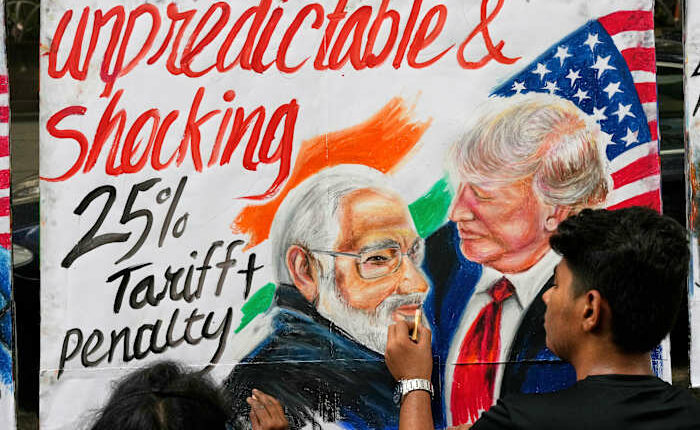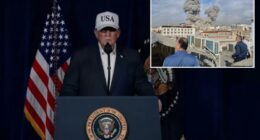Share this @internewscast.com

NEW DELHI – The two men embraced warmly, complimenting each other generously and sharing the stage at large public gatherings, creating a strong visual image for these two leaders who share similar populist ideologies. They each referred to the other as a close ally.
In India, the cordial relationship between Prime Minister Narendra Modi and U.S. President Donald Trump was considered unique. However, recent developments have created obstacles.
From Trump’s imposition of tariffs to India’s oil deals with Russia, and the U.S.’s leanings toward Pakistan, tensions between New Delhi and Washington have become evident, often highlighted through Trump’s social media activity.
This has left analysts questioning if the once strong camaraderie is diminishing, even as Trump avoids directly mentioning Modi online. A decline in their relationship, some argue, could jeopardize the strategic partnership developed over years.
“This is a testing time for the relationship,” said Ashok Malik, a former policy adviser in India’s Foreign Ministry.
The White House did not immediately respond to a message seeking comment.
Simmering tensions over trade and tariffs
The latest strain emerged when Trump declared a 25% tariff on India and an unspecified penalty due to India’s Russian oil purchases. This move by India’s biggest trade partner could impact numerous sectors and caused apprehension, particularly after Trump labeled India’s economy as “dead” on social media.
According to a White House source who requested anonymity, Trump’s recent remarks indicate his dissatisfaction with the sluggish trade negotiations with India. The official stated that there is no strategic shift toward Pakistan, but rather, Trump is adopting a tough negotiation stance.
Trump doubled down on the pressure Monday with a fresh post on Truth Social, in which he accused India of buying “massive amounts” of oil from Russia and then “selling it on the Open Market for big profits.”
“They don’t care how many people in Ukraine are being killed by the Russian War Machine. Because of this, I will be substantially raising the Tariff paid by India to the USA,” he said.
The messaging appears to have stung Modi’s administration, which has been hard-selling negotiations with Trump’s team over a trade deal by balancing between India’s protectionist system while also opening up the country’s market to more American goods.
Many expected India to react strongly considering Modi’s carefully crafted reputation of strength. Instead, the announcement prompted a rather careful response from India’s commerce minister, Piyush Goyal, who said the two countries are working towards a “fair, balanced and mutually beneficial bilateral trade agreement.” India’s Foreign Ministry also played down suggestions of any strain.
However, experts in New Delhi wonder.
“Strenuous, uninterrupted and bipartisan efforts in both capitals over the past 25 years are being put at risk by not just the tariffs but by fast and loose statements and social media posts,” said Malik, who now heads the India chapter of The Asia Group, a U.S. advisory firm .
Malik also said the trade deal the Indian side has offered to the U.S. is the “most expansive in this country’s history,” referring to reports that India was willing to open up to some American agricultural products. That is a politically sensitive issue for Modi, who faced a yearlong farmers’ protest a few years ago.
Trump appears to be tilting towards Pakistan
The unraveling may have gained momentum over tariffs, but the tensions have been palpable for a while. Much of it has to do with Trump growing closer to Pakistan, India’s nuclear rival in the neighborhood.
In May, India and Pakistan traded a series of military strikes over a gun massacre in disputed Kashmir that New Delhi blamed Islamabad for. Pakistan denied the accusations. The four-day conflict made the possibility of a nuclear conflagration between the two sides seem real and the fighting only stopped when global powers intervened.
But it was Trump’s claims of mediation and an offer to work to provide a “solution” regarding the dispute over Kashmir that made Modi’s administration uneasy. Since then, Trump has repeated nearly two dozen times that he brokered peace between India and Pakistan.
For Modi, that is a risky — even nervy — territory. Domestically, he has positioned himself as a leader who is tough on Pakistan. Internationally, he has made huge diplomatic efforts to isolate the country. So Trump’s claims cut a deep wound, prompting a sense in India that the U.S. may no longer be its strategic partner.
India insists that Kashmir is India’s internal issue and had opposed any third-party intervention. Last week Modi appeared to dismiss Trump’s claims after India’s Opposition began demanding answers from him. Modi said that “no country in the world stopped” the fighting between India and Pakistan, but he did not name Trump.
Trump has also appeared to be warming up to Pakistan, even praising its counterterrorism efforts. Hours after levying tariffs on India, Trump announced a “massive” oil exploration deal with Pakistan, saying that some day, India might have to buy oil from Islamabad. Earlier, he also hosted one of Pakistan’s top military officials at a private lunch.
Sreeram Sundar Chaulia, an expert at New Delhi’s Jindal School of International Affairs, said Trump’s sudden admiration for Pakistan as a great partner in counterterrorism has “definitely soured” the mood in India.
Chaulia said “the best-case scenario is that this is just a passing Trump whim,” but he also warned that “if financial and energy deals are indeed being struck between the U.S. and Pakistan, it will dent the U.S.-India strategic partnership and lead to loss of confidence in the U.S. in Indian eyes.”
India’s oil purchases from Russia are an irritant
The strain in relations has also to do with oil.
India had faced strong pressure from the Biden administration to cut back its oil purchases from Moscow during the early months of Russia’s invasion of Ukraine. Instead, India bought more, making it the second-biggest buyer of Russian oil after China. That pressure sputtered over time and the U.S. focused more on building strategic ties with India, which is seen as a bulwark against a rising China.
Trump’s threat to penalize India over oil, however, brought back those issues.
On Sunday, the Trump administration made its frustrations over ties between India and Russia ever more public. Stephen Miller, deputy chief of staff at the White House, accused India of financing Russia’s war in Ukraine by purchasing oil from Moscow, saying it was “not acceptable.”
Some experts, though, suspect Trump’s remarks are mere pressure tactics. “Given the wild fluctuations in Trump’s policies,” Chaulia said, “it may return to high fives and hugs again.”
___
Associated Press writer Michelle L. Price in Washington contributed reporting.
Copyright 2025 The Associated Press. All rights reserved. This material may not be published, broadcast, rewritten or redistributed without permission.











